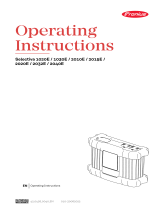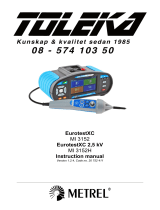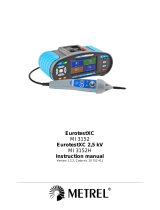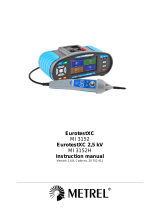Page is loading ...



USER MANUAL
INSULATION RESISTANCE METER
MIC-5001
SONEL S.A.
Wokulskiego 11
58-100 Świdnica
Poland
Version 1.07 01.06.2023

MIC-5001 – USER MANUAL
2
Thank you for purchasing the MIC-5001 insulation meter. Please acquaint yourself with this manual
to ensure safe operation, and avoid operational errors that can affect measurement results.
This device complies with part 15 of the FCC Rules. Operation is subject to the following two
conditions: (1) This device may not cause harmful interference, and (2) this device must accept
any interference received, including interference that may cause undesired operation.
This equipment has been tested and found to comply with the limits for a Class A digital de-
vice, pursuant to part 15 of the FCC Rules. These limits are designed to provide reasonable
protection against harmful interference when the equipment is operated in a commercial envi-
ronment. This equipment generates, uses, and can radiate radio frequency energy and, if not
installed and used in accordance with the instruction manual, may cause harmful interference
to radio communications. Operation of this equipment in a residential area is likely to cause
harmful interference in which case the user will be required to correct the interference at his
own expense.
CAUTION:
Equipment changes or modifications not expressly approved by SONEL S.A., the party re-
sponsible for FCC compliance, could void the user’s authority to operate the equipment, and
could create a hazardous condition.

MIC-5001 – USER MANUAL
3
CONTENTS
1 Safety ................................................................................................................ 4
2 Turning the meter ON and activating screen backlight. .............................. 5
3 Meter configuration ......................................................................................... 5
4 Measurements .................................................................................................. 8
4.1 Measurement of insulation resistance ....................................................................... 8
4.1.1 Double-lead measurement ................................................................................................ 8
4.1.2 Three-lead measurement ................................................................................................ 13
4.2 Measuring the resistance with increasing voltage – RampTest ............................... 14
4.3 Voltage measurement ............................................................................................. 18
4.4 Tightness test of MV cable jacket ............................................................................ 19
5 Memory of measurement results ................................................................. 20
5.1 Storing the measurement results in the memory ..................................................... 20
5.2 Viewing memory data .............................................................................................. 22
5.3 Deleting memory data ............................................................................................. 23
5.3.1 Deleting bank data .......................................................................................................... 23
5.3.2 Deleting the whole memory ............................................................................................. 24
6 Data transmission .......................................................................................... 26
6.1 Computer connection accessories .......................................................................... 26
6.2 Data transmission with USB joint ............................................................................ 26
7 Processing the measurement results .......................................................... 27
8 Software updates ........................................................................................... 28
9 Power supply .................................................................................................. 28
9.1 Monitoring the power supply voltage ....................................................................... 28
9.2 Charging the rechargeable batteries ....................................................................... 29
9.3 General principles regarding using Ni-MH rechargeable batteries .......................... 30
10 Cleaning and maintenance ........................................................................... 30
11 Storage ............................................................................................................ 31
12 Dismantling and disposal ............................................................................. 31
13 Technical specifications ............................................................................... 31
13.1 Basic data ............................................................................................................... 31
13.2 Additional uncertainties according to IEC 61557-2 (RISO)........................................ 33
14 Accessories .................................................................................................... 34
14.1 Standard accessories .............................................................................................. 34
14.2 Optional accessories ............................................................................................... 34
15 Manufacturer .................................................................................................. 35

MIC-5001 – USER MANUAL
4
1 Safety
MIC-5001 meter is designed for performing check tests of protection against electric shock in
mains systems. The meter is used for making measurements and providing results to determine safety
of electrical installations. Therefore, in order to provide conditions for correct operation and accuracy
of obtained results, the following recommendations must be observed:
Before you proceed to operate the meter, acquaint yourself thoroughly with the present manual
and observe the safety regulations and specifications provided by the producer.
Any application that differs from those specified in the present manual may result in a damage to
the device and constitute a source of danger for the user.
MIC-5001 meters must be operated only by appropriately qualified personnel with relevant certifi-
cates authorising the personnel to perform works on electric systems. Unauthorized use of the me-
ter may result in its damage and may be a source of serious hazard to the user.
During measurements of insulation resistance, dangerous voltage of approx. 5 kV occurs at the
ends of measurement wires of the meter.
Before the measurement of insulation resistance you must be sure that tested object is discon-
nected from the power supply.
During the measurement of insulation resistance do not disconnect test leads from the tested ob-
ject before the measurement is completed (see par. 4.1); otherwise the capacitance of the object
will not be discharged, creating the risk of electric shock.
Using this manual does not exclude the need to comply with occupational health and safety regu-
lations and with other relevant fire regulations required during the performance of a particular type
of work. Before starting the work with the device in special environments, e.g. potentially fire-
risk/explosive environment, it is necessary to consult it with the person responsible for health and
safety.
It is unacceptable to operate the device when:
a damaged meter which is completely or partially out of order,
a meter with damaged insulation,
a meter stored for an excessive period of time in disadvantageous conditions (e.g. excessive
humidity).If the meter has been transferred from a cool to a warm environment with a high level
of relative humidity, do not start measurements until the meter is warmed up to the ambient
temperature (approximately 30 minutes).
Remember that bAt message appearing on the display indicates insufficient voltage of power
supply and the need to recharge the batteries.
Message ErrX displayed in the main field , where X is a number from 0 to 9, indicate incorrect op-
eration of the meter. If after restarting the device this situation is repeated - it indicates that the
meter is damaged. Please contact the manufacturer's service.
Before measurement, choose a correct measurement function and make sure that test leads are
connected to respective measuring terminals.
Do not power the meter from sources other than those listed in this manual.
The RISO inputs of the meter are protected electronically from overload (e.g. due to having been
connected to a live circuit) up to 750 V RMS for 60 seconds.
Repairs may be performed only by an authorised service point.
Note:
Due to continuous development of the meter’s software, the actual appearance of the display,
in case of some of the functions, may slightly differ from the display presented in this operat-
ing manual.

MIC-5001 – USER MANUAL
5
2 Turning the meter ON and activating screen backlight.
Turn on the meter with button.
Short press button to turn the screen backlight
on; press the button again to turn the backlight off.
Turn on the meter by pressing and keeping button
pressed. for approx. 2 sec.
Failure
Pressing button for approx. 7 seconds will turn
off the meter in case of emergency.
3 Meter configuration
+
Turn on the meter by pressing and keeping
SET/SEL button pressed.
Use buttons and to set Auto-OFF time or
to inactivate this function (horizontal lines – Auto-
OFF function is inactive). Auto-OFF function is
used to turn-off inactive meter after a preselected
time (300, 600 or 900 sec.). When the user
switches the meter off, it will generate a beep af-
ter the set time.
Use and buttons to enter the screen with
audio message settings: bEEP.

MIC-5001 – USER MANUAL
6
Use and buttons to turn the audio mes-
sages ON ( ) or OFF ( ).
Press and buttons to enter the settings
of absorption coefficients FAC.
Use and buttons to set DAR parameters
for Ab1, Ab2 or polarization index PI.
Use and buttons to move to the filtration
FL settings.
MIC-5001 has an analogue filter which
damps variable component of current
and allows measurements in an envi-
ronment with strong electromagnetic
interference.
Activation of FL filtration causes a
slight increase of time needed to sta-
bilize the measurements. The meter
has 3 setting modes of filter operation.

MIC-5001 – USER MANUAL
7
Use and buttons to set the filtration mode:
"AUTO" – Detection of noise activates the
filter. "NOISE" mnemonic is displayed. The
recommended setting.
"ON" – filter always ON, the detection of
noise (despite enabled filter) results in dis-
playing "NOISE" mnemonic.
"OFF" – filter always OFF, the detection of
noise results in displaying "NOISE" mne-
monic.
Use and buttons to enter the screen with
software update UPdt.
Press ENTER to enter the update mode. The update
process is described in Chapter 8
After changing the parameters, you may exit SETUP menu (not applicable for
Update screen):
Press ENTER to memorize settings or use ESC button
to go to the measurement screen without approving the
changes.

MIC-5001 – USER MANUAL
8
4 Measurements
4.1 Measurement of insulation resistance
WARNING:
The tested object must not be live.
Attention:
During measurement, especially of high resistances, make sure that test leads
do not touch each other and probes (crocodile clips), because such a contact
may cause the flow of surface currents resulting in additional error in meas-
urement results.
WARNING:
In a dusty and humid environment, do not open plugs of USB sockets and
charger.
4.1.1 Double-lead measurement
Use or button to enter the measure-
ment of RISO (yellow LED is ON ). The me-
ter is in the voltage measurement mode.
Press SET/SEL button to enter the selection of:
measuring voltage UISO (50 V…500 V at
50 V steps and above 500 V at 100 V
steps)
times for calculating absorption coeffi-
cients t1, t2, t3 (up to 600 sec.)
interval between points of characteristics
ChA (15, 30, 45 or 60 sec.).
Use and buttons to set V+ISO value
confirm by pressing ENTER

MIC-5001 – USER MANUAL
9
or use button to enter the setting of times
for calculating the absorption coefficients.
Use and buttons to set t1 value, use
button to start setting t2 and then t3 value.
Press again to enter the setting of time in-
terval ChA of recording RISO.
Use and buttons to set the interval value.
Horizontal lines indicate unavailability of record-
ing characteristics.
or
Press ENTER to confirm settings or press
ESC to exit without saving the changes.

MIC-5001 – USER MANUAL
10
Connect test leads ac-
cording to the drawing.
The meter is ready
for measurement.
Press and hold START push-button.
The measurement is performed continuously un-
til you release the button or the pre-set time is
reached.
for 5 seconds.
or
+
In order to maintain (hold) the measurement
press and hold START button for 5 sec. or press
ENTER while holding START . The buttons may
be released after symbol is displayed,
which indicates the automeasurement. The
measurement will end after the longest pre-set
time (t1, t2 or t3) runs out. To interrupt or termi-
nate the measurement earlier in the absence of
pre-set t1, t2 or t3 values (measurement without
time limit), press again START or ESC button.

MIC-5001 – USER MANUAL
11
View of the screen during
measurement.
means that the measure-
ment was started with
ENTER button or by press-
ing and holding START
button for approx. 5 sec.
Use SET/SEL to display
values of leakage current IL.
After the measurement is
completed or stopped, read
the result. The results of all
completed measurements
will be displayed (even when
the measurement was inter-
rupted/stopped e.g. after 60
sec.). When the meter
switched into standby mode,
the measurement result may
be recalled by pressing
ENTER.
Use and to see individual components of the result
in the following order:
RISO→IL→Ab2→Ab1→Rt3→It3→Rt2→It2→Rt1→It1
→RISO.
If the measurement is stopped, the displayed values will
present the results of partial measurements that have
been completed and "---" will represent uncompleted par-
tial measurements.
If the characteristic was measured, then the measurement
results may be read between It1 and RISO.

MIC-5001 – USER MANUAL
12
Note:
During measurements of insulation resistance, dangerous voltage of approx.
5 kV occurs at the ends of measurement wires of the meter.
It is forbidden to disconnect test leads before the measurement is completed.
Disconnection may lead to high voltage electric shock and prevents discharg-
ing of the tested object.
- Disabling t2 will also disable t3.
- Timer measuring the measurement time is started when UISO voltage is stabilized.
- Symbol LIMIT means operation with limited inverter power. If this condition persists for 20 sec., the
measurement is interrupted.
- If the timer reaches characteristic points ('tx' times or characteristic times), then for 1 sec. instead
UISO a symbol (mnemonic) of this point is displayed which is accompanied by a long beep.
- If the value of any of the measured partial resistance is out of range, the value of the absorption coef-
ficient is not shown - horizontal dashes are displayed.
- During the measurement LED is flashing in yellow.
- When the measurement is complete, capacity of the tested object is discharged by shorting terminals
RISO+ and RISO- with resistance of approx. 100 k. Message "diS" is displayed. Do not disconnect the
test leads before the object capacity id discharged.
- When during viewing the results, voltage is present at terminals RISO, LED RISO will blink in red and
additional two-tone beep will be generated.
- In case of power cables measure the insulation resistance between each conductor and other con-
ductors shorted and grounded (figure below).

MIC-5001 – USER MANUAL
13
Additional information displayed by the meter
Test voltage is present on terminals of the meter.
NOISE!
Interference voltage higher than 25 V but lower than 50 V, is pre-
sent on the tested object. Measurement is possible but may be
burdened with additional uncertainty.
READY disappears, LED
lights red, two-tone beep
Interference voltage higher than 50 V, is present on the tested ob-
ject. The measurement is blocked.
LIMIT I!
Activation of current limit. The symbol displayed is accompanied
by a continuous beep.
Breakdown of the tested object insulation, the measurement is in-
terrupted. The message appears after displaying LIMIT I! for 20
sec. during the measurement, when the voltage previously
reached the nominal value.
, RISO LED is
blinking in red and two-
tone acoustic signal is
generated
During the measurement, AC voltage appeared or the object can-
not be discharged for 30 sec. Immediately disconnect the test
leads.
4.1.2 Three-lead measurement
In order to eliminate the influence of surface resistance in transformers, cables, etc. the three-lead
measurement is used. For example:
at the measurement of inter-winding resistance of a transformer, G socket of the meter should
be connected to the transformer tank;

MIC-5001 – USER MANUAL
14
when measuring insulation resistance between one of the cable conductors and the cable jack-
et, the effect of surface resistances (important in difficult weather conditions) is eliminated by
connecting a piece of metal foil insulating the tested conductor with G socket of the meter;
The same shall apply when measuring the resistance between two conductors of the cable, at-
taching to G terminal other conductors that do not take part in the measurement.
4.2 Measuring the resistance with increasing voltage – RampTest
Use or button to enter RampTest measurement of
(yellow LED is ON ).
The meter indicates readiness for
measurement with increasing voltage.
Connect test leads to the
tested object.
Conductor
Cable sheath
Metal foil wrapped around the conductor insulation

MIC-5001 – USER MANUAL
15
Use SET/SEL button to enter the settings of the measuring voltage
UISO and measurement duration settings.
Setting of the measuring voltage UISO is adjusted within the range
from 50 V to 500 V in 50 V steps, whereas above 500 V to 5 kV in
100 V steps.
The measurement time may be set in
the range from 5 sec. to 99 min. Set-
ting UISO values and the measurement
time allows to calculate the voltage in-
crease ratio, expressed in V/s. The
voltage increase ratio adjusted from
0.005 V/s (for UISO = 50 V and t = 99
min.) up to 996 V/s. (for UISO= 5.0 kV
and t = 5 sec.) When the setting of the
voltage increase ratio is ≥ 50 V/s, then
the meter will display message
not showing the value of the
measured resistance and but only the
value of breakdown voltage.
Use and buttons to set voltage UISO, signalled by
pulsating light. Use button to set time t=XX’ for values
expressed in minutes or press again button to set time
t=XX” expressed in seconds.
Press ENTER to confirm the settings.
To start the measurement press and hold START button.
The measurement is performed continuously until you re-
lease the button or the pre-set time is reached.
for 5 seconds.
or
+
In order to maintain (hold) the measurement press and hold
START button for 5 sec. or press ENTER while holding
START button. Symbol will be displayed, indicat-
ing auto-measurement - you may release the buttons. The
measurement will be completed when the preset time is
achieved or when the tested insulation is broken (punc-
tured). In order to interrupt the measurement press START
button again or ESC. Pay attention, whether the tested ob-
ject is discharged (LED is not flashing). Until the object is
fully discharged, do not disconnect the test leads and do
not touch the tested object.

MIC-5001 – USER MANUAL
16
View of the screen during meas-
urement. means that
the measurement was started
with ENTER button or by press-
ing and holding START button for
approx. 5 sec.
Use SET/SEL to display values of
leakage current IL.
After the measurement is com-
pleted or stopped, read the result.
The results of all completed
measurements will be displayed
(even when the measurement was
interrupted).
When the meter switched into
standby mode, the measurement
result may be recalled by pressing
ENTER.
Use and buttons to browse the measured values of
resistance and leakage current at specific time intervals.
Resistance RISO value, measured
in time t=5’30’. Symbol indi-
cates the selected time interval,
in which the resistance value was
recorded.

MIC-5001 – USER MANUAL
17
The value of leakage current IL
measured in time t=5’30’. Symbol
indicates the selected time
interval, in which the leakage cur-
rent value was recorded.
If the electric resistance strength
of the tested insulation is eceed-
ed and the puncture occurs, the
main field of the display will
show message - break-
down.
Additional information displayed by the meter
NOISE!
Interference voltage occurs on the tested object. The
measurement is possible however it will be burdened
with additional uncertainty that is specified in the tech-
nical data.
, LED
is blinking in red
and two-tone
acoustic signal is
generated
Interference voltage exceeds the allowable value, the
measurement is blocked.
Breakdown - the tested object is damaged. The insula-
tion has been pierced.
In case of RampTest measurement, the analogue filter FL is not active.

MIC-5001 – USER MANUAL
18
4.3 Voltage measurement
Use or buttons to enter the measure-
ment (green LED is ON ). The meter is
in the voltage measurement mode.
Connect the meter to a
voltage source.
Measurement is per-
formed in a continu-
ous manner.
Additional information displayed by the meter
>750V, LED is
blinking in red,
two-tone acoustic
signal is generated
Measuring range is exceeded. Voltage is higher than
acceptable. Immediately disconnect the test leads.
~
-
When AC voltage is detected, the device will display
symbol "~" ("wave") and when DC voltage is detected,
the device will display symbol "-" for negative polarity
or "nil" for positive polarity.
V
V
/



